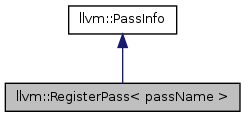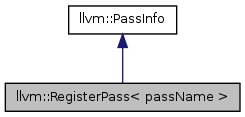#include <PassSupport.h>


Public Member Functions | |
| RegisterPass (const char *PassArg, const char *Name, bool CFGOnly=false, bool is_analysis=false) | |
Detailed Description
template<typename passName>
struct llvm::RegisterPass< passName >
RegisterPass<t> template - This template class is used to notify the system that a Pass is available for use, and registers it into the internal database maintained by the PassManager. Unless this template is used, opt, for example will not be able to see the pass and attempts to create the pass will fail. This template is used in the follow manner (at global scope, in your .cpp file):
static RegisterPass<YourPassClassName> tmp("passopt", "My Pass Name");
This statement will cause your pass to be created by calling the default constructor exposed by the pass. If you have a different constructor that must be called, create a global constructor function (which takes the arguments you need and returns a Pass*) and register your pass like this:
static RegisterPass<PassClassName> tmp("passopt", "My Name");
Definition at line 110 of file PassSupport.h.
Constructor & Destructor Documentation
| llvm::RegisterPass< passName >::RegisterPass | ( | const char * | PassArg, |
| const char * | Name, | ||
| bool | CFGOnly = false, |
||
| bool | is_analysis = false |
||
| ) | [inline] |
Definition at line 113 of file PassSupport.h.
References llvm::PassRegistry::getPassRegistry(), and llvm::PassRegistry::registerPass().
The documentation for this struct was generated from the following file:
 1.7.6.1
1.7.6.1